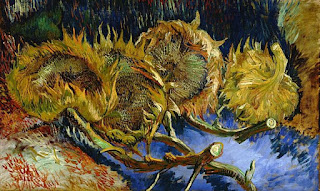The concept is easily followed, though. Vincent van Gogh offers a parallel in one of his sunflower paintings. It isn't one of the paintings that has golden yellow flowers at the peak of blooming, standing in a vase against a light-colored background. Instead the artist shows the flowers at the end of life.
Gone to seed is a phrase usually meant to indicate something that is past its prime. A place that looks uncared for or shabby is said to have gone to seed. The root of the phrase is in agriculture. When plants finish flowering, the flowers fade and the leaves fall off the plant. At that stage the energy of the plant is devoted to making seeds, so the condition of the leaves, stems and flowers begin to deteriorate.
It is at this stage that the structure of the plant gives way, falling apart and allowing the seeds to move into the earth. And each of those seeds will grow into a new plant whose identity is programmed on the genetic material that provides the blueprint for what that plant will become. In other words, the laws of development are written internally on the plant's DNA. A sunflower seed will grow into a sunflower rather than a delphinium or a cabbage.
Vincent van Gogh. Four Sunflowers Gone to Seed. 1887. Otterlo, Netherlands: Kroller-Muller Museum.
Seeds are what make development and growth an internal process. A lab experiment can influence development of one generation, but it is genetic material that transfers characteristics from one generation to the next. If you want to make an abiding change that will be retained in future generations, the seeds will need to be changed. The genetic material writes the laws of development on the "heart" of the plant that grows from the seed. And if the plant doesn't go to seed, then there will be no next generation to inherit those traits.
Going to seed may mean being past one's prime, but the seeds are shaping the next generation. And that's important because the days are surely coming, says the Lord, when I will make a new covenant.
It's sort of the same thing that Jesus talked about when he said that unless a grain of wheat dies, it will just be a single grain (John 12:20-33). But if it does die, it can bear much fruit.
 For one use of Psalm 51, click on the Art&Faith Matters Facebook page.
For one use of Psalm 51, click on the Art&Faith Matters Facebook page.
For additional thoughts on John 12:20-33, click on this link.


No comments:
Post a Comment